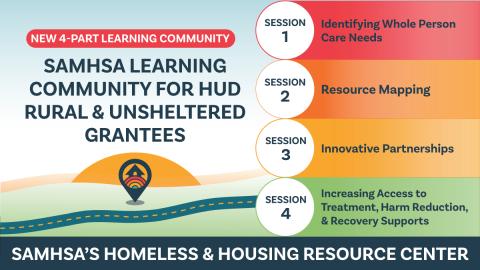Knowledge & Resources
Search and download a library of information and resources for health professionals and housing specialists.
Featured Article

This Learning Community for HUD Rural and Unsheltered grantees will focus on supporting Continuums of Care (CoCs) in understanding and building cross-system partnerships that address the needs of individuals and families impacted by substance use and/or mental disorders among those experiencing unsheltered homelessness and homelessness in rural areas.
Read MoreExplore The Resources
Filter
Clear AllResults
-
Toolkit Eviction Prevention: A Toolkit for Tenants and Service Providers
This Toolkit outlines strategies for supporting people with mental health conditions, substance use disorders, or co-occurring disorders living in community-based low-income housing to prevent eviction.
Article New Staff Orientation Guide
This guide compiles introductory resources offered by HHRC into an orientation guide for new professionals. These resources provide introductions to substance use, serious mental illness, achieving and maintaining housing, and treatment and engagement models.
-
Toolkit Disaster Planning and Response: A Guide to Preparation for Homelessness Response Programs
This guide outlines questions that homelessness response programs should answer as they plan for and respond to natural disasters. The guide places a focus on the needs of people experiencing homelessness with serious mental illness (SMI), substance use disorder (SUD), or co-occurring disorders (CODs).
-
Toolkit Whole-Person Care for People Experiencing Homelessness and Opioid Use Disorder: Toolkit Part 2
This guide focuses on understanding the neurobiology of opioid use disorder (OUD) and the treatment and recovery pathways for OUD. The guide covers best practices for referrals and warm handoffs, as well as assistance in meeting basic needs such as income, food, and mainstream benefits.
-
Toolkit Guide to Methamphetamine Use, Treatment, and Housing Considerations for People Experiencing Homelessness
This guide explores how service providers can better support people who use methamphetamine in the process of transitioning into and maintaining housing.